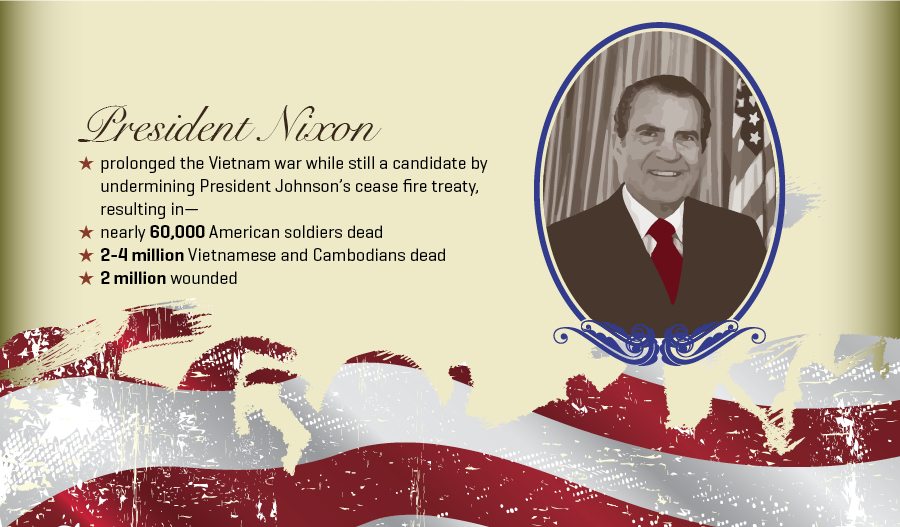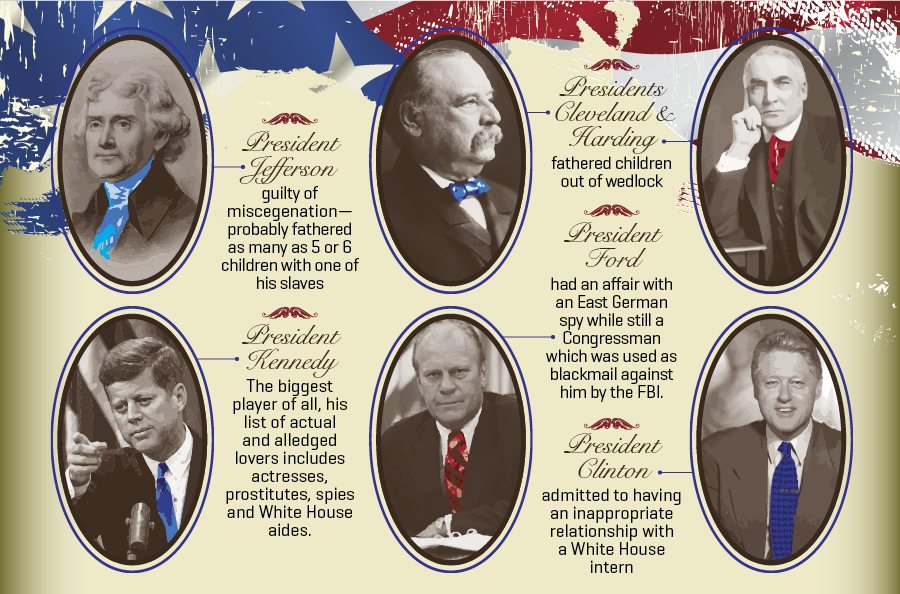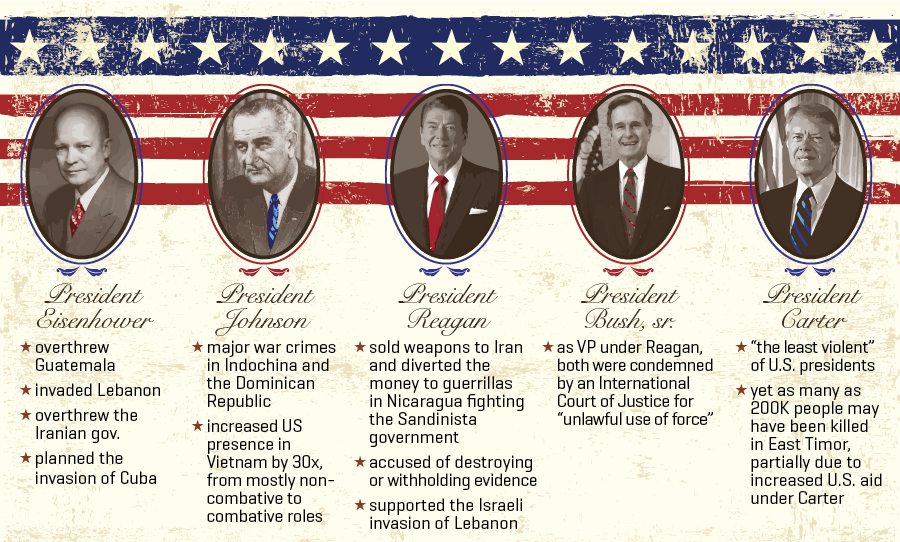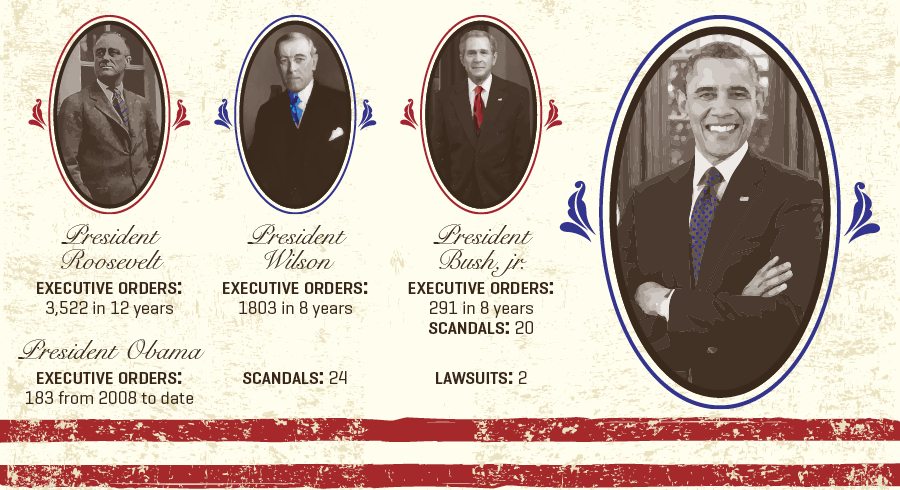Presidential Misconduct Happens. We expect high standards of behavior and a degree of morality from each presidential candidate. POTUS, the office of the President of the United States, is considered one of the most powerful positions in the world, if not the most powerful, regardless of who is elected.
We typically expect high standards of behavior and a degree of morality from each president, whether we acknowledge this consciously or not. Unfortunately, not all of them live up to our collective minimal expectations. Some presidents complete their terms without any major incidents, while others rack up “misconducts” as if they were winning ribbons. Some even manage to keep their misdeeds secret; most go unpunished.
Featured Schools
The Lies of Presidents
A browse through the history of our presidents shows a lot of “misconducts,” depending on how you define that – with some presidents “guilty” in multiple categories. The offenses range from serious to minor, such as lying, mostly for political gain. Lying is something that many of us expect from the average politician; enough so that we often make jokes about that fact. Yet we still keep electing politicians into office at all levels of government. When presidents or presidential candidates lie, comedians make fun of them. Comedians had a field day with George H.W. Bush’s “read my lips, no new taxes” comment, which he uttered as a presidential candidate for his 1988 campaign. One variation was “read my lips, no new taxis.” Another was “read my lips, no new Texans.” Bush himself apparently later said to a reporter, “read my hips.”

For a composite of reasons, Bush Sr didn’t hold to his promise — something granddaughter Lauren Bush essentially blames on Congress. Bush was even honored in May 2014 for his “courage” in doing the opposite by coming up with a budget compromise for 1990. This compromise may in fact have cost Bush Sr. re-election. Bill Clinton won the 1992 campaign and mentioned Bush’s taxes renege as part of his strategy.
Of course, President Nixon famously said, “I am not a crook,” which history and the evidence would suggest is a pretty big lie. Many members of his administration also went to prison. According to Burt Wides (former White House and Senate Counsel, Intelligence Oversight, and lead investigator for the CIA for the Watergate Scandal) in an interview with Paul Jay for trnn.com Nixon did something particularly illegal that put blood on his hands.
As for the other presidents, there’s no doubt that some – maybe even all – have told some degree of lie at some point just to get into power or to hold on to it. But unless a president lies in court (perjury) or under oath in general, there’s not all that much that can be done legally. Also, if a president is in a situation where he perjures himself, he already has bigger problems with which to deal.
[Tweet “If a president is in a situation to perjure himself, he already has bigger problems to deal with.”]
Cheating: The Affairs of Presidents
Another less common trait of politicians, at least that we know about, is cheating on a spouse — which in many states is still illegal, as are certain types of sex acts. As of early 2014, adultery is illegal in 21 states, although it was 23 states in late 2011, and 26 just a few years before. Several states have repealed adultery laws in the recent past, and more may follow suit. Punishment varies by state, ranging from a few dollars in fines all the way up to life imprisonment — according to the 2007 comments of one Michigan judge. A 1998 Washington Post article points out that adultery is a crime in Washington, D.C. – where at least current day Presidents obviously reside during their term in office. However, that is no longer the case; adultery laws in D.C. were repealed in 2004, along with some other fornication laws — leaving only divorce as a recourse.
As several presidents and some presidential hopefuls are known to have had affairs or rumored so, the changes in adultery and fornication laws are probably a good thing for them. Some presidents had affairs before office, some during, some after or all of the above. The soft-spoken Jimmy Carter once admitted to having had lust in his heart — although he is not known to have had any affairs. “Honest Abe” Lincoln — who was supposedly so honest that he is rumored to have walked a mile (or three) when he was a young store clerk, to return a penny to someone he had overcharged — had some secrets. No, he was neither a vampire hunter nor a zombie hunter. Lincoln’s long-time partner, William Herndon, revealed after Lincoln’s death the latter’s supposed love for a woman (Ann Rutledge) other than his wife (Mary Todd). Lincoln himself may have told Mary Todd, while they were courting, that he was in love with a popular young woman, Matilda Edwards.

However, that’s not the last of Lincoln’s secrets of the heart. Some historians doubt Lincoln’s love for Rutledge, since there was no historical evidence of such a relationship. Herndon may actually have made that up to cover up something else: that Lincoln may have been gay, or at least bisexual. Writer/ sexologist Sylvia Rhue, Ph.D., wrote in Huffington Post that she met a descendant of Herndon who claimed that Herndon had been gay as well as Lincoln’s lover. There are also rumors that Lincoln had other dalliances with men, including his companion Joshua Speed, and his bodyguard David Derickson. At the time (and even to this day) certain sexual acts were illegal in many states regardless of sexual preference, making it certain that being gay was equated with illegal behavior. This is a fact that a lawyer like Lincoln would be fully aware of would need to hide very well, were the accusations true. Hence, this may be why Herndon claimed that Lincoln loved Ann Rutledge. Lincoln is only one amongst a number of other presidents who might have been gay.
[Tweet “Lincoln is only one amongst a number of other presidents who might have been gay.”]
Another sexual act that was illegal in the past in some states was “miscegenation,” which is essentially interracial sex or breeding. It’s now an accepted fact that some slave owners had sex with their slaves and fathered mixed-race children. One such is alleged to be President Thomas Jefferson. Technically, Jefferson was not cheating on his wife Martha, since she was by then deceased. However, the alleged lover was his slave Sarah “Sally” Hemings, either the half-sister of his wife or her step-sister, depending on the account. While it was denied in the recent past, a fairly recent DNA analysis of one Hemings’ descendants shows a high probability that Jefferson fathered her youngest son Eston Hemings, and likely all of her five or six children (depending on the account). This is counter to the original claims by Jefferson’s official descendants that his cousins were the fathers, which DNA evidence shows not to be true.
A couple of other presidents either fathered a child or were accused of fathering a child out of wedlock, including Grover Cleveland and Warren G. Harding. Of all the other presidents who either had affairs or were accused of them (13 of 16 total), Bill Clinton doesn’t even compare to the biggest “player” of them all: the immensely charismatic John F. Kennedy. If the stories of his philandering are even partly true — something wife Jackie was said to have known about — he seems to have turned presidential affairs into a sport, having affairs he’d need two hands or more to count.
JFK’s list of actual and alleged lovers includes actresses, prostitutes, spies and White House aides. JFK’s actress roster alone (actual and alleged) included Marilyn Monroe, Marlene Dietrich, Kim Novak, Angie Dickinson, Gene Tierney and others. Gerald Ford, president by default after Nixon resigned, apparently also had an affair with the very same alleged East German spy while he was still a Congressman — info that J. Edgar Hoover (head of the FBI) supposedly used to blackmail Ford into revealing what he knew about what the Warren Commission was pursuing, leads-wise.
The War on Drugs?
The list of presidents confirmed to have taken drugs is relatively small — about seven — although a number of other presidents potentially consumed certain other substances as well. On the low end of the substance scale, a number of early presidents grew hemp crops — used for rope, clothing, paper and other purposes. Hemp is produced from low-THC strains of the Cannabis Sativa plant, while marijuana comes from higher THC strains.
Since the plant was legal at the time, it’s entirely possible that hemp farmers George Washington, Thomas Jefferson, and James Madison smoked marijuana. Other presidents who possibly (not confirmed) also partook of the wacky weed for various reasons: James Monroe, Abraham Lincoln, John F. Kennedy, Jimmy Carter. Confirmed presidential users of marijuana: Andrew Jackson, Franklin Pierce (hashish, a derivative of marijuana), Bill Clinton (but he claims not to have inhaled), George W. Bush (Jr), and Barack Obama. There are also a number of presidential hopefuls who have supposedly used marijuana, including Al Gore, Sarah Palin, at least 13 state Governors and numerous other politicians.
Now, if marijuana is in fact the gateway drug to harder substances that some anti-drug campaigns claim, it’s not evident in most of these presidents. George Washington is thought to have taken Laudanum, an opiate derivative. Andrew Johnson, who is not known to have used marijuana, did consume cocaine in the form of then-legal throat drops for his throat cancer. (Cocaine was once a legal substance in Coca-Cola as well.) Bill Clinton and Barack Obama may have taken cocaine (unconfirmed). George W. Bush admitted to cocaine use but once stated that he had been drug-free since 1974.
That said, if there were a prize for presidential drug consumption, JFK would win. Amongst the drugs he was both confirmed and rumored to have taken, besides the aforementioned marijuana, are LSD and a host of prescription drugs — painkillers for his back, stimulants and barbiturates.
[Tweet “If there were a prize for presidential drug consumption, JFK would win”]
Killers and Warmongers
A number of presidents have killed men directly or were presumed to have done. In most cases, it was before they took office, not during. Specifically, George Washington and James Monroe were both soldiers and likely killed people. Andrew Johnson, Ulysses S. Grant, Rutherford B. Hayes, James Garfield, Benjamin Harrison, and William McKinley were all Civil War commanders. John Tyler and James Buchanan fought in other 19th century wars and possibly killed people. Theodore Roosevelt claimed killing men during the battle of San Juan Hill. Harry Truman served in WW I, and Dwight Eisenhower, John F. Kennedy, Lyndon Johnson, Richard Nixon, Gerald Ford and George H.W. Bush all served in WW II — so some or all saw combat and potentially killed enemy soldiers.
Outside of war, Andrew Jackson killed a man in a duel, defending the honor of his wife. Grover Cleveland, while a Sheriff of Buffalo / Erie County, New York, felt the need to personally see to the execution by hanging of three men. Bill and Hillary Clinton had fingers pointed at them regarding the death by supposed suicide of Vincent Foster; however they were cleared of wrongdoing.

Aside from the direct killing of people, there are presidents with blood on their hands from wars started, prolonged or aided. One such was James K. Polk. Polk, was considered a “successful” president, due to the considerable number of new states that were acquired for the United States under his term in office: eight full states and parts of four states (with the remainder of the land for the partial states acquired after his term in office). This includes Texas, California, Oregon, Washington, Idaho, Nevada, Utah, Wyoming, and parts of Montana, Arizona, New Mexico, and Colorado. However, the annexation of Texas triggered a two-year war with Mexico.
Ulysses S. Grant called the resulting Mexican-American war unjust. From Grant’s memoirs: “For myself, I was bitterly opposed to the measure, and to this day regard the war [with Mexico] which resulted as one of the most unjust ever waged by a stronger against a weaker nation. It was an instance of a republic following the bad example of European monarchies, in not considering justice in their desire to acquire additional territory.” (Grant followed Polk into the presidency seven terms of office later.)
In more recent history, the “hands of blood” roster includes, but is not limited to, at least Eisenhower, Kennedy, Lyndon Johnson, Richard Nixon, Ronald Reagan, and the Bushes (father and son). In 1990 (during the early part of George H. W. Bush’s term) , linguistics professor and political pundit Noam Chomsky gave a talk on American foreign policy. He said “[i]f the Nuremberg laws were applied, then every post-war American president would have been hanged. By violation of the Nuremberg laws, I mean the same kind of crimes for which people were hanged in Nuremberg. And Nuremberg means Nuremberg and Tokyo.” He meant that if the same rules used at Nuremberg and Tokyo post WWII were applied to recent American presidents, all of them (up to and including George H.W. Bush) would technically be guilty.
For example, General Yamashita was hanged in Tokyo because troops in the Philippines — technically under his command, but with whom he had no contact — were still running around after WW II ended and committing atrocities. By the same Nuremberg rules, post-WWII U.S. presidents would also be guilty. While Chomsky was not saying that U.S. presidents should be hanged, he was pointing out how guilt of bloodletting could be associated with them.
Here’s a summary of Chomsky’s tally of U.S. aggression under recent American presidents, with additional notes from other sources:
- Truman’s involvement in a counter-insurgency campaign resulted in 160,000 people dead in Greece, with many thousands tortured and many thousands become refugees, followed by American corporations taking over since the political system was dismantled.
- Eisenhower overthrew Guatemala with a CIA-backed army and U.S. threats, invaded Lebanon, and overthrew the government of Iran (also with the help of the CIA).
- Eisenhower also planned the invasion of Cuba (Bay of Pigs Fiasco), shortly after Castro overthrew the Cuban government that had long been friendly with the U.S., and Kennedy “inherited the program” (according to history.com).
- Under Kennedy’s administration, the CIA trained and backed the roughly 1,200 Cuban exiles who attempted to overthrow Castro, unsuccessfully. Then “Kennedy launched a huge terrorist campaign against Cuba, which was very serious. No joke.” This included numerous bombings and eventually led to the Cuban Missile Crisis of Oct 1962, due to Soviet aid extended to Castro. The world was potentially on the brink of nuclear disaster. Kennedy also “invaded Vietnam” (South Vietnam, 1962), with the U.S. Air Force dropping bombs.
- Lyndon Johnson’s war involvement included the Indochina war and the Dominican Republic, which “was a major war crime,” according to Chomsky. Johnson also increased American presence in Vietnam by 30 times as many personnel, going from mostly non-combative roles to combative roles in 1968.
- Nixon invaded Cambodia, which Chomsky likens to the Khmer Rouge atrocities that took place there previously. Nixon also sent troops into Laos, and under his administration, livestock in Cuba was poisoned, as part of the continuing campaign against Cuba launched under Kennedy.
- During Ford’s short period, he supported the genocide in oil-rich East Timor (Indonesia).
- Chomsky calls Carter “the least violent of American presidents” (at least as of 1990), yet as many as 200,000 people may have been killed in East Timor in total, partially due to the increased U.S. aid under Carter.
- Under Reagan, there was the Iran-Contra affair. One part of the scandal involves money from weapons sales diverted to Contra guerrillas in Nicaragua fighting the Sandinista government. Reagan testified that he knew nothing about the funding — although his administration was accused of destroying or withholding evidence. The money for the Contras came from weapons sales to Iran. What was actually supposed to happen, based on Congress’ legislation, was the transfer of anti-tank missiles from Israel to Iran. Chomsky points out that there was also support under the Reagan administration for the Israeli invasion of Lebanon.
- During the Reagan administration, both he and George H.W. Bush (Vice President) were condemned by an International Court of Justice decision about the “unlawful use of force.”
In addition to Bush Sr’s probable involvement during the Reagan administration, there’s his possible involvement behind the scenes during his son’s administration — though son George W. has enough of his own misconducts. TheDailyBeast.com lists 20 Bush scandals for him and/or his administration, in one of the biggest lists for any U.S. presidential administration. Some of these are relatively small, but some involved war or the disappearance of billions of dollars. In one case, $12.8B (half the budget) disappeared from the reconstruction of Iraq, under L. Paul Brenner’s term as head of the Coalition Provisional Authority (May 2003 to Jun 2004). Then there was the $1.8B Haliburton didn’t account for. This is Dick Cheney’s company, which allegedly made nearly $40M gross profit (officially) on the the Iraq War, by some accounts. Plus the several billion in no-bid contracts made by a Haliburton subsidiary, KBR, and more.
The Impeached and the Impeachable
Despite all this history of blood in U.S. foreign policy, only a handful of presidents have had the threat of impeachment leveled at them: Andrew Johnson, Bill Clinton, Richard Nixon, George W. Bush and Barack Obama — and not always due to war. Regarding impeachment, the U.S. Constitution states, “The President, Vice President and all Civil Officers of the United States, shall be removed from Office on Impeachment for, and Conviction of, Treason, Bribery, or other high Crimes and Misdemeanors.” [U.S. Constitution, Article II, section 4]
Andrew Johnson was impeached for violating the Tenure of Office Act when he removed his Secretary of War, Edwin Stanton, from the cabinet without approval by Congress. Stanton was an ally of the “Radical Republicans” who did not want Johnson to follow through on Lincoln’s plans for Reconstruction. The Senate vote was one short of the 2/3 needed for conviction.
Richard Nixon had a lot of things going on, including the Pentagon Papers and then Watergate. There was talk of impeaching Nixon; however, he resigned before he could be impeached. After his VP Gerald Ford became President (the only one who was neither elected to the VP or President roles), Ford pardoned Nixon. (Some take the pardon by Ford and the acceptance of the pardon by Nixon as proof of guilt.) Nixon was also sued by the United States for refusing to turn over requested tapes and papers.
Bill Clinton was impeached for perjury relating to the Monica Lewinsky affair (first denying “sexual relations” with her then later admitting it). However, he was acquitted and like Johnson, completed his term in office. He was also sued in 1997 by Paula Jones, who filed a sexual harassment suit against him. She accepted a settlement of $850,000.
George W. Bush, was not impeached, however, there is talk of impeaching both him and VP Dick Cheney after the fact for starting what is deemed by some as an illegal war in Iraq. Bush was also convicted in absentia of being a war criminal by the Kuala Lumpur War Crimes Commission in a trial held in 2012 in Kuala Lumpur. Seven other members of Bush’s administration were also convicted in absentia. Related to these issues, Bush was sued in 2013 (along with other members of his administration) by an Iraqi mother, for violating the Nuremberg Principles because of the “crimes of aggression against the Iraqi people.” Bush himself sued Al Gore over the 2000 presidential election and the vote recounts in Florida (where George’s brother Jeb Bush was the Governor). The Florida Supreme Court ordered a manual recount because of the close victory Bush had, but the U.S. Supreme Court stopped the recount, giving Bush the victory.
President Obama
Current president Barack Obama has been under fire since before his first term in office as well as through both terms. Accusations and charges vary. For example, Obama has been accused of not being very bright — which of course is not a criminal offense, although presidential IQ is said to play a significant role in the effectiveness of a president. Yet, given the wide range of IQ levels that each of the most recent presidents have been assigned by different analysts, it seems the methodology for determining presidential IQ is inaccurate anyway. George W. Bush has been deemed both a “moron” – based on an estimated IQ as low as 89 – and quite a bit above average at 138. Bill Clinton has alternately been deemed above average (~135) to being well beyond the minimal IQ for being a genius (~160). Jimmy Carter’s score has ranged from 130 to as high as 180. The ranges are not surprising given that there are different IQ tests with different scoring.

Obama has also been accused of issuing more Executive Orders (EOs) than any president in history and this “fact” is an indicator of his dishonesty. The claim is laughable because the Web sites that are publishing an alleged list of presidential EO counts put most of the presidents listed at barely a handful. They claim that President Obama has signed nearly 1,000 EOs and also that FDR had signed none. The truth of the matter is that FDR signed the most EOs of any president (over 3,500 over four terms in office), and Obama had only signed 183 as of Aug 1, 2014 — less than the 291 that George W. Bush signed and the 364 that Bill Clinton signed in their respective eight years. While Obama still has some time left in his second term, it’s highly unlikely he’ll come close to FDR’s 3,522 Executive Orders, nor even Woodrow Wilson’s 2nd place 1,803 EOs.
In 2011, Obama was sued in 2011 by Dennis Kucinich and eight other House members for taking military action in Libya without Congress’ consent. The charge was that he violated the 1973 War Powers Resolution, but the case was dismissed by a federal judge who indicated that there was no standing for the suit.
In Aug 2013, veteran White House reporter Keith Koffler wrote that the Obama administration was at two dozen scandals. (George W. Bush had at least 20, as noted earlier.) In 2014, there has been talking of impeaching Obama on a variety of charges, including some of the scandals Koffler mentions. The impeachment dialog has come up since Obama’s first term as president. The accusations vary, from not being a “natural born U.S. citizen” (a requirement to be President) to the Affordable Care Act (ACA), also known as Obamacare, and other reasons. Talk also turned from impeachment to suing the president for how Obamacare would affect employers — although nothing official has come to pass at the time of writing.
The Final Tally
If you dig deep enough, every U.S. president in history has upset or angered someone — sometimes enough to be assassinated or have assassination attempts. Very few have been impeached, although some had their names smeared in the media. William Howard Taft even so disappointed their mentor and earlier president Teddy Roosevelt that the latter opposed Taft’s re-nomination and went and formed his own political party. Although when you’ve been the President of the United States, if you come out of office alive, regardless of the misconducts you have committed, history suggests that it’s unlikely that any of the accusations will seriously affect your power and influence.
References
Information for this article was collected from the following Web pages and sites.
- http://barrybradford.com/how-many-presidents-have-killed-a-man/
- http://www.britannica.com/EBchecked/topic/467822/James-K-Polk/5829/Presidenc
- http://www.cato.org/sites/cato.org/files/pubs/pdf/bp122.pdf
Related: